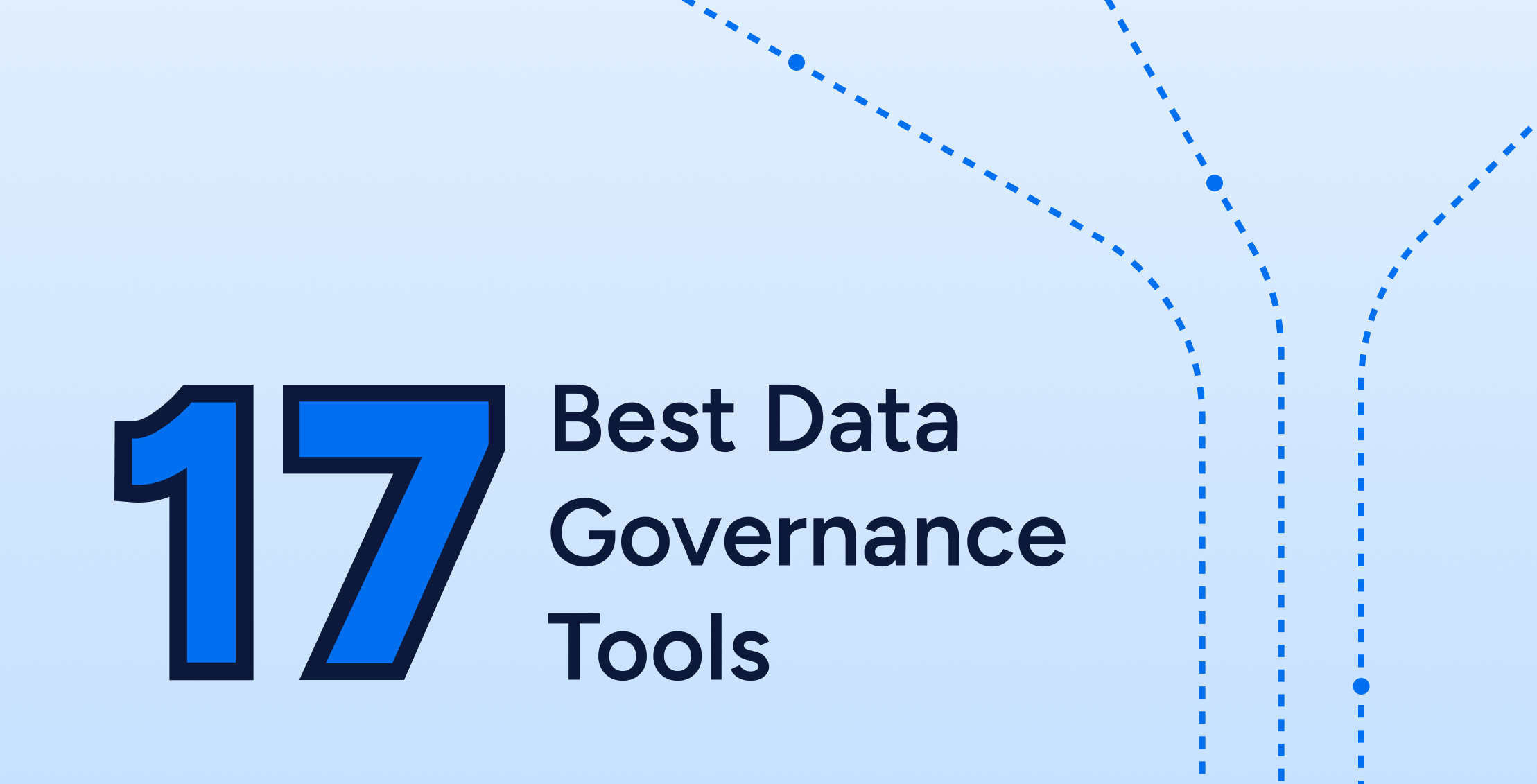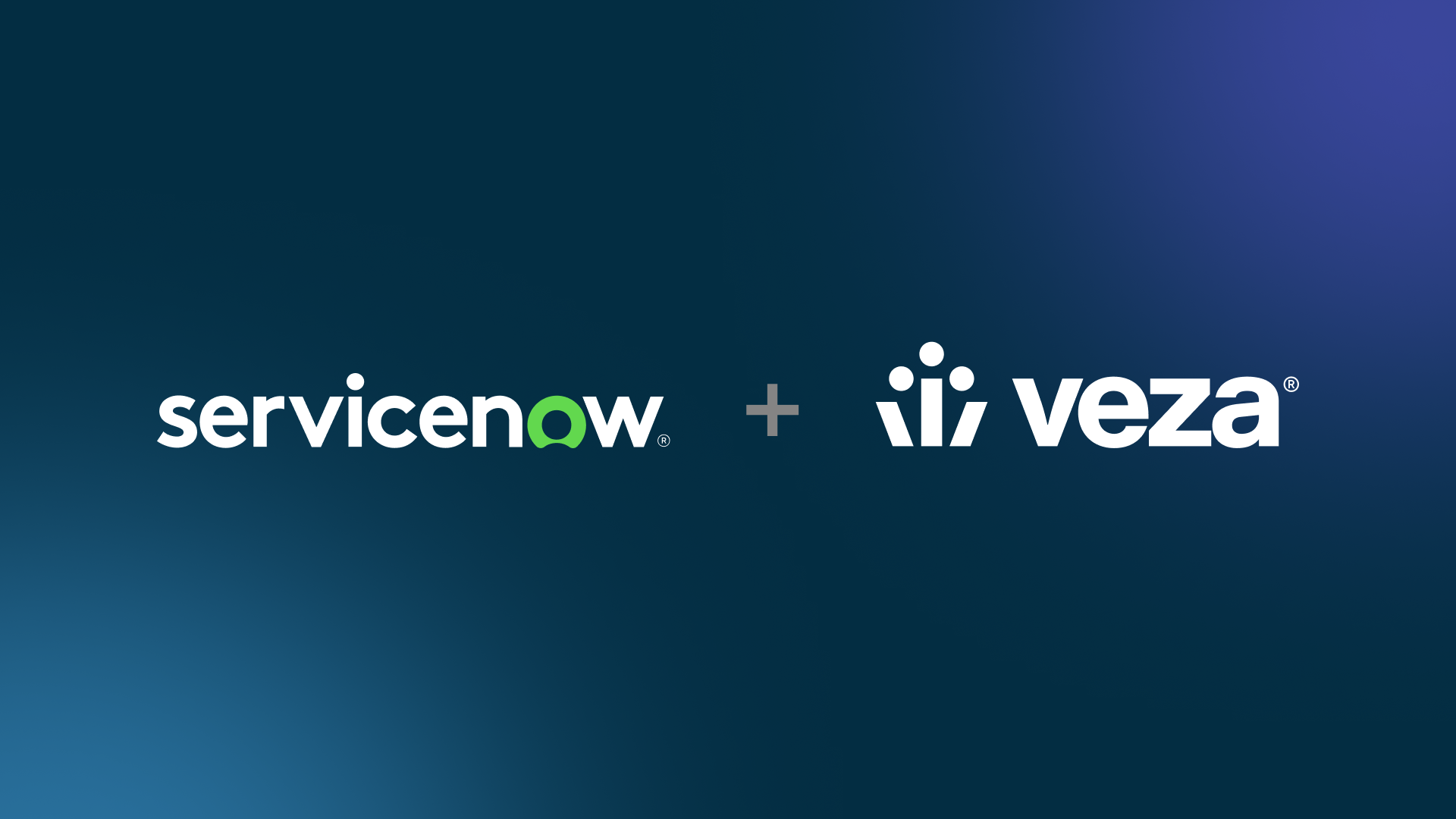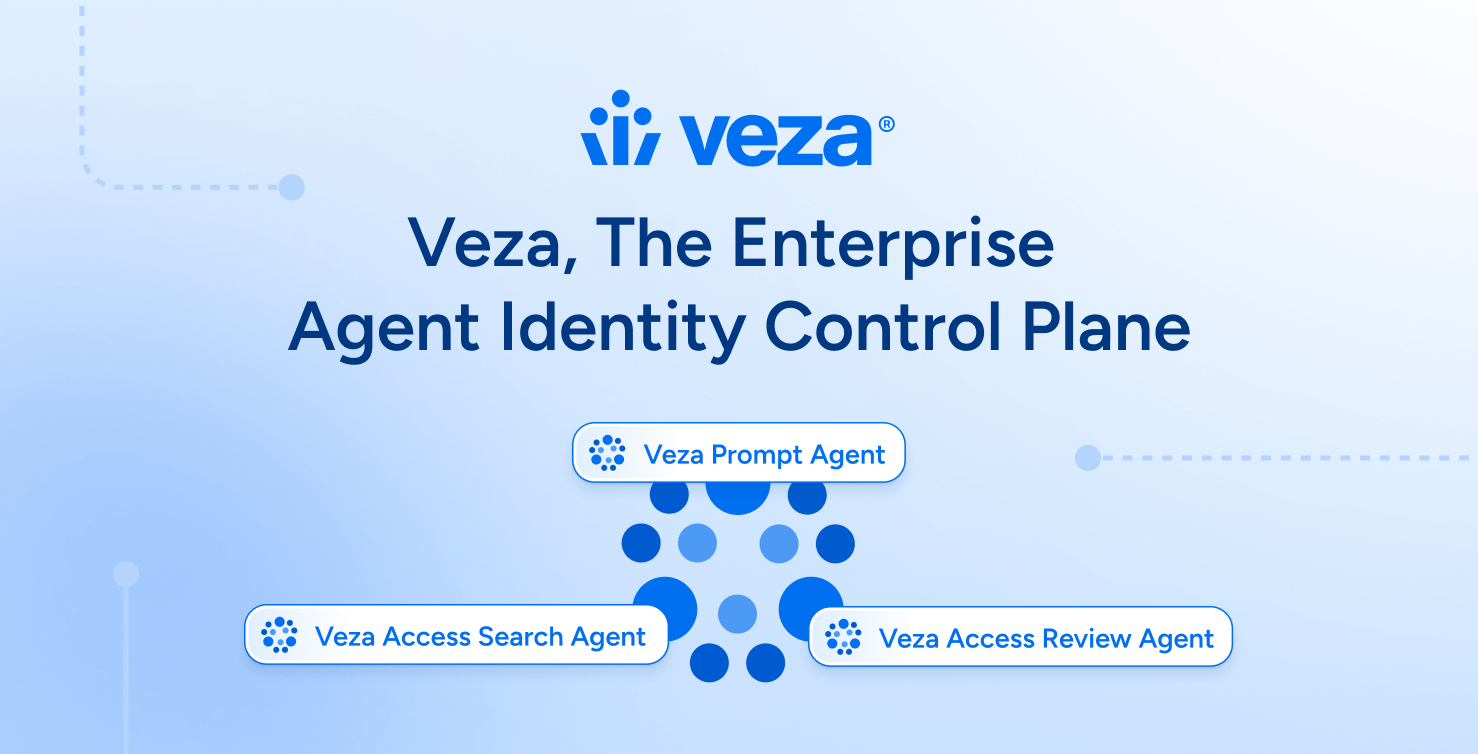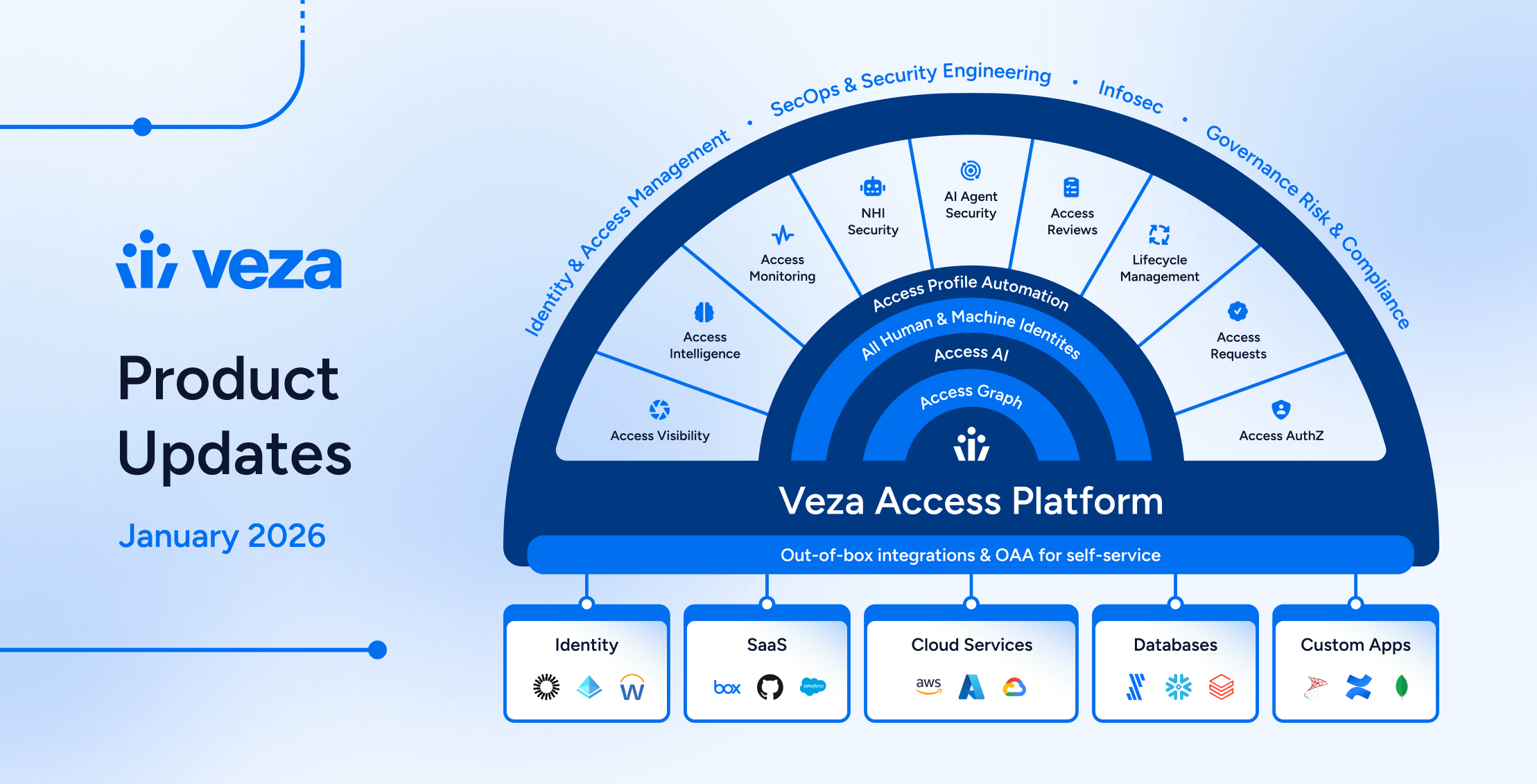
Modern businesses handle a ton of data. According to the AI and Information Management Report, 64% of organizations manage at least one petabyte of data while 41% of organizations manage at least 500 petabytes of data.
As data continues to pile on, you may realize it’s getting harder to ensure effective management, security, and use of data. Data governance tools help manage data quality, ensure compliance, control access, and make data-driven decisions. In this guide, we discuss the top 17 data governance tools for you to choose from.
What is a data governance tool?
Data governance tools are software solutions that help organizations manage, control, and ensure appropriate use of data. Their primary goal is to maintain data quality, security, and compliance through policies, processes, and responsibilities for data handling.
What are the pillars of data governance?
Proper data governance maximizes the value of data. Successful data governance requires strategic vision and operational rigor in:
- Security and privacy: Access control, encryption, and audit trails are critical to prevent unauthorized access, data breaches, and data misuse. However, the right balance is critical: over-restriction can stifle innovation and slow down operations, while lax controls leave you vulnerable to legal liabilities.
- Lifecycle management: A governance framework must manage the data lifecycle from creation to deletion. This includes defining when data becomes obsolete, how to purge it securely, and archiving practices for compliant, long-term data storage.
- Quality: The quality (accuracy, consistency, completeness, and reliability) of data is critical for data-driven decision-making. It requires proactive data monitoring through profiling, cleansing, and enrichment processes.
- Stewardship and ownership: Data owners define data management policies, while stewards enforce the policies to ensure compliance.
- Metadata management: Metadata management improves data transparency through cataloging origins, definitions, transformations, and usage. This reduces ambiguity around data meaning and usage rules, leading to better decisions and streamlined operations.
- Regulatory compliance: Monitor changes in data usage, sharing, and storage in real time to ensure compliance. Noncompliance can lead to hefty penalties and loss of reputation.
What are the benefits of using data governance tools?
Using the right data governance tools can lead to:
- Better data security: Protects confidential and sensitive data through access control and encryption.
- Improved data quality: Ensures that all data sources are accurate, consistent, and reliable.
- Enhanced compliance: Helps meet regulatory requirements from GDPR and HIPAA.
- A single source of truth: Acts as your single source of truth, allowing you to make informed, data-driven decisions.
- Streamlined data management: Data governance tools streamline data management processes and reduce data duplication and silos.
- Clear data ownership: Assigns accountability through defined roles, improving collaboration and governance.
- Metadata and lineage tracking: Improves transparency of data and helps trace data origins and transformations for auditability.
Data governance tools are a non-negotiable part of any company’s stack, but data governance functionalities aren’t enough by themselves. You also need a tool on top of your data governance tool that offers complete visibility and control over access permissions.
That’s where Veza comes in. Veza gives you complete visibility into access permissions across cloud and on-premise systems. With Veza, it’s easy to see who has access to what, which helps reduce the risk of over-permission roles or dormant accounts for both human and non-human identities.
Veza gives you a visual presentation of permissions updated in real time so you can manage permissions and align them with your data governance policies. Veza integrates with your existing infrastructure and works alongside your data governance tools to give you more control, reduce manual labor, and improve compliance. Learn more about how Veza can help improve data governance through access control and security across your organization.
Best Tools for Data Governance
Whether you’re looking to enhance visibility, automate compliance, or secure sensitive information, the market offers a variety of data governance solutions. Here are some of the best data governance tools available today, designed to help you manage and protect your data with confidence.
- SAP Master Data Governance
SAP Master Data Governance (MDG) helps manage, govern, and ensure master data quality across the enterprise. It allows you to create, modify, and distribute master data centrally, ensuring consistency and accuracy throughout the organization. It integrates with SAP’s wider ecosystem and supports master data domains such as customer, supplier, finance, material, and more.
Key Features:
- Out-of-the-box data models
- Change request and versioning
- SAP S/4HANA integration
- Analytics and reporting capabilities
- Role-based access control (RBAC)
The article includes platform features and images from SAP Master Data Governance (MDG) website that reflect the information available as of its publishing date.
- Atlan
Atlan offers a data workspace that helps with data discovery, governance, and collaboration. It helps data teams make data-backed decisions by streamlining the management of metadata, governance policies, and workflows.
Key Features:
- Automated metadata management across all data sets
- Active data glossary
- Customizable and extensible workflows
- Visual data asset lineage
The article includes platform features and images from Atlan website that reflect the information available as of its publishing date.
- Alation Data Governance App
Alation Data Governance app streamlines data governance processes through collaboration, metadata management, and data stewardship. It’s built on top of Atlation’s data catalog and allows organizations to easily discover, govern, and share data while maintaining visibility and control.
Key Features:
- Data catalog integration
- Automated stewardship and policy management
- Audit trails and compliance reporting
- Collaboration features (commenting, tagging, and sharing of data assets)
- RBAC
The article includes platform features and images from Alation website that reflect the information available as of its publishing date.
- Collibra
Collibra is a data governance and intelligence platform with tools for data discovery, governance, cataloging, quality management, and compliance across large and complex data ecosystems.
Key Features:
- End-to-end data intelligence
- Automated workflows
- Extensive integration ecosystem
- Data lineage and impact analysis features
- Audit trails and compliance reporting
The article includes platform features and images from Collibra website that reflect the information available as of its publishing date.
- Snowflake Data Governance
Snowflake data governance refers to Snowflake’s data governance tools and features. Snow offers RBAC to manage and assign roles with varying levels of access to different users. While Snowflake’s RBAC system is extensive, it’s also complex. You may have multiple roles with overlapping privileges and nested roles that create a web of permissions.
There’s also a disconnect between Snowflake, which knows roles and permissions, and identity providers (IdPs), which know which users or groups can assume those roles. Neither Snowflake nor the IdP can easily track and connect these federated identities to specific Snowflake permissions.
To bridge these gaps, integrate Snowflake with Veza. It gives you a unified view of identities and their specific permissions in Snowflake as well as simplifies access permissions with visibility into role assignments and privileges.
Key Features:
- Dynamic data masking
- Object tagging and classification
- Time travel and data retention
- RBAC
- Data lineage
The article includes platform features and images from Snowflake website that reflect the information available as of its publishing date.
- Salesforce Security and Privacy
Salesforce Security and Privacy helps protect sensitive business and customer data while ensuring compliance with regulations like GDPR, CCPA, and PCI DSS. Salesforce offers RBAC, but it’s highly complex and makes it difficult to access provisioning outcomes and maintain a least-privilege security model.
Salesforce environments often handle a large number of users, machine identities, and other resources, and managing this scale with traditional security tools is tough. Then there’s the problem of separately managing local roles and permissions from IdPs.
Integrating Salesforce with Veza makes it easier to manage Salesforce access—it helps understand exactly who has access to what and provides a unified view showing how external identities (from IdPs) relate to permissions granted within Salesforce.
Key Features:
- Data masking
- Audit trails
- Data classification
- Field-level security
- Duplicate management
The article includes platform features and images from Salesforce website that reflect the information available as of its publishing date.
- Secoda
Secoda is a data discovery and management platform that integrates with databases, data warehouses, data lakes, and BI tools. It helps data teams centralize data knowledge, making it easier for technical and non-technical users to find and access data.
Key Features:
- Data discovery
- Data documentation
- Collaboration tools like commenting, tagging, and annotating data assets
- Automated metadata management
The article includes platform features and images from Secoda website that reflect the information available as of its publishing date.
- OneTrust Data Governance
OneTrust Data Governance is part of the broader OneTrust Suite which focuses on privacy, security, and compliance. It provides a centralized platform for data discovery, classification, and governance, while also addressing privacy and security concerns.
Key Features:
- Centralized data catalog
- Data quality management
- Automated workflows
- Privacy management
- Data lineage
The article includes platform features and images from OneTrust website that reflect the information available as of its publishing date.
- Oracle DB
Oracle DB is a powerful database management system (DBMS). While it’s not inherently a data governance tool, it offers various features and integrations that facilitate data governance tasks such as access control, data auditing, and compliance. Your best bet is to integrate Oracle DB with a platform like Veza to gain more control over access permissions and data.
Key Features:
- Metadata discovering and harvesting
- Data lineage and impact analysis
- Metadata visualization and reporting
- Metadata versioning and history
- Custom workflows for metadata governance
The article includes platform features and images from the Oracle DB website that reflect the information available as of its publishing date.
- Syniti Knowledge Platform
Syniti Knowledge Platform (SKP) provides tools to help you manage data assets efficiently across various environments. In addition to monitoring data quality, it provides actionable insights to address data quality issues. It also includes pre-built solutions and templates for industries like manufacturing, healthcare, and finance.
Key Features:
- Data discovery and profiling
- Data migration and transformation
- Master Data Management (MDM) integration
- Automated data cleansing
The article includes platform features and images from Syniti Knowledge Platform (SKP) website that reflect the information available as of its publishing date.
- erwin Data Intelligence
erwin Data Intelligence helps organizations discover, understand, and govern data assets with a focus on ensuring compliance and improved decision-making. The platform is tightly integrated with erwin’s data modeling tools that allow you to connect data models with metadata catalog and governance framework.
Key Features:
- Data cataloging
- Impact analysis
- Data quality management
- Collaboration and workflow automation tools
- Audit trails and user activity monitoring
The article includes platform features and images from erwin website that reflect the information available as of its publishing date.
- Informatica Axon Data Governance
Informatica Axon Data Governance helps organizations maintain data compliance, transparency, and accountability through a centralized platform for defining, documenting, and enforcing governance policies. The platform’s strong focus on aligning business and IT teams allows business users and technical teams to collaborate effectively on governance initiatives.
Key Features:
- Policy management
- Data stewardship and ownership
- Integrated data quality management
- Self-service data access through data marketplace
- Automated governance workflows
The article includes platform features and images from Informatica website that reflect the information available as of its publishing date.
- Precisely Data360
Precisely Data360 provides tools for metadata management, data quality, data lineage, and policy enforcement. It’s focused on delivering trusted data for decision-making and offers advanced data lineage and impact analysis capabilities to help you fully understand the implications of data changes on your organization.
Key Features:
- Data quality management
- Policy enforcement and workflow automation
- Impact analysis
- Data discovery and profiling
- Audit trails and compliance reporting
The article includes platform features and images from Precisely Data360 website that reflect the information available as of its publishing date.
- OvalEdge, LLC
OvalEdge, LLC is a data governance and data cataloging platform that helps manage, discover, and govern data assets. It focuses on data democratization through its self-service data discovery capabilities to make it easier for users across the organization to discover and access data.
Key Features:
- Access requests and approvals
- Cataloging and data lineage
- Data governance framework
- Data quality monitoring
- Compliance and audit reporting
The article includes platform features and images from OvalEdge, LLC website that reflect the information available as of its publishing date.
- Egnyte
Egnyte provides secure file sharing, content collaboration, and data governance solutions. It offers a great platform to manage unstructured data, such as documents, videos, and images, that are often harder to govern than structured data like databases.
Key Features:
- Content collaboration and file sharing
- Data loss prevention capabilities
- Content lifecycle management
- Ransomware and threat detection
- Real-time analytics and reporting
The article includes platform features and images from Egnyte website that reflect the information available as of its publishing date.
- Ab Initio
Ab Initio helps manage, process, and transform large volumes of data. It offers a visual workflow designing feature called Graphical Development Environment (GDE) that you can use to design data pipelines, ETL processes, and complex transformations without plenty of coding. It also supports parallel processing, fault tolerance, and resource management through its underlying runtime environment called Co>Operating System.
Key Features:
- GDE
- Metadata and governance tool
- Data quality and cleaning tools
- Data lineage tracking
The article includes platform features and images from Ab Initio website that reflect the information available as of its publishing date.
- Apache Atlas
Apache Atlas is an open-source data governance and metadata management tool primarily used in Hadoop-based big data ecosystems. It’s capable of automatically discovering and cataloging metadata through its deep integration with tools like Apache, Hive, Apache HBase, and Apache Spark.
Key Features:
- Data classification and tagging
- Rich set of REST APIs
- Graph-based metadata model
- Policy enforcement via Apache Ranger
The article includes platform features and images from Apache Atlas website that reflect the information available as of its publishing date.
How to Find the Right Data Governance Tool
Here are the factors to consider when choosing a data governance tool:
- Core functionality: Choose a data governance tool that covers all essential aspects of data governance. This may include data cataloging, centralized metadata management, data lineage tracking, and compliance and policy management.
- Key features: Look for features like access controls, automated workflows, integration capabilities, and audit trails and reporting.
- Usability and collaboration tools: A business-friendly interface will reduce the reliance of non-technical users on IT teams. Look for built-in collaboration tools, such as the ability to comment, tag, and share data assets to allow users to collaborate on governance policies.
- Customization: The best governance tools allow you to customize governance policies and rules based on your specific data governance framework. This helps you configure the tool to align precisely with your unique data management needs, compliance requirements, and business goals.
- Vendor support and community: Check the service level agreements (SLAs) to understand the level of support the vendor offers. See if the vendor provides training resources, documentation, and tutorials. If you’re considering an open-source tool, see if there’s an active community for troubleshooting and advice.
Choose the best data governance tool for managing your data
Choosing the right data governance tool is critical, but often, data governance tools can make access management either way too complex or too basic. They’re not specialized access management solutions, which means they often lack features like automated provisioning and de-provisioning.
When you don’t have access to these capabilities, you run the risk of having undetected overpermissioned accounts, are unable to achieve least-privilege access, and may fail to comply with regulatory norms.
That’s where Veza comes in. Veza integrates with your data governance tool. Once integrated, Veza:
- Simplifies RBAC
- Reduces risk by allowing you to surface and prioritize identities with the highest privilege, risk, or policy issues
- Continuously identifies and remediates identity misconfigurations, dormant permissions, and over-permissioned identities
- Governance, Risk & Compliance (GRC) for automatically compiling and assigning access reviews and certifications for sensitive data.
With Veza, you can reduce identity risks through continuous policy reinforcement and achieve least privilege. When you use Veza with your data governance tools, you get:
- Faster time to value: Veza connects to your systems within minutes and delivers instant value through visibility and remediation and ready-to-use intelligence on key risks and misconfigurations.
- Intelligent access for unstructured data: Understand and control access to unstructured data in your data lakes, ML datasets, shared drives, and cloud storage.
- Broader coverage: Veza covers all your systems. The native integrations cover on-prem apps, cloud services, SaaS apps, and data lakes. Additionally, Veza’s Open Authentication API (OAA) allows you to build quick custom integrations to bridge any gaps.
- Scalability: Veza’s purpose-built graph infrastructure is tailor-made to handle the scale and complexity you need as a large enterprise. Veza is built to seamlessly support AI/ML-based capabilities, from access recommendations to universal search and more.
- Better security: Veza relies on industry-best practices, including independent penetration testing, data encryption at rest and inflight, strict RBAC, complete tenant isolation, and zero external access. Veza is SOC 2 Type II and ISO 27001 certified.
- Compliance: Veza streamlines access reviews for data systems for major regulatory and compliance frameworks, such as SOX, ISO27001, SOC, and GDPR.
Conclusion & Next Steps
As data governance tools grapple with access complexity, it’s clear: layered governance only gets you part of the way. To truly enforce least privilege, manage identities at scale, and simplify compliance, you need both a governance framework and a dedicated access-control solution that integrates seamlessly with your existing stack — that’s where Veza shines.
For a clear view on how simplified compliance looks in practice, start with this insightful blog:
How Veza Simplifies SOX Compliance: Automating Access Controls & SoD Monitoring (2025) — Explore how Veza helps organizations automate compliance workflows, enforce segregation of duties, and reduce risk.
For deeper insights into governance automation and access control in practice:
On-Demand Webinar: Blackstone’s Approach to Identity Governance with Veza — Learn how Blackstone streamlined access reviews and enforced least privilege across complex data environments.
Ready to move forward? Schedule a demo with our experts for a tailored walkthrough, or kickstart your evaluation with Veza’s free trial—delivering immediate, no-commitment value.
About the Contributors
This article was developed by Quoc Hoang, Principal Product Manager – Competitive Intelligence at Veza, whose expertise in competitive intelligence and identity security brings authoritative market insight.
He collaborated with Arjun Ruparelia, an experienced B2B content writer skilled at translating complex security topics into clear, practical narratives for both technical and business audiences.
Madeline Hogan, Head of Content at Growth Marketing Pro, provided editorial guidance to ensure clarity and consistency across the piece.
Together, their combined expertise delivers a reliable and insightful resource on identity governance.





